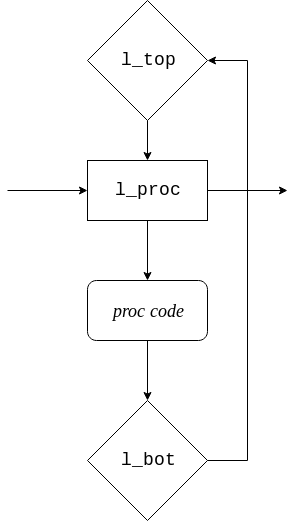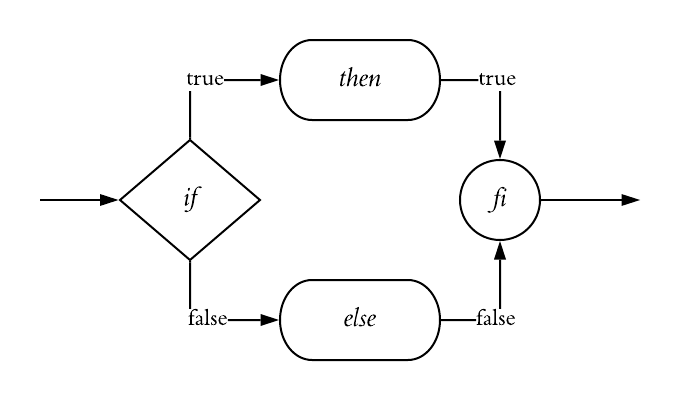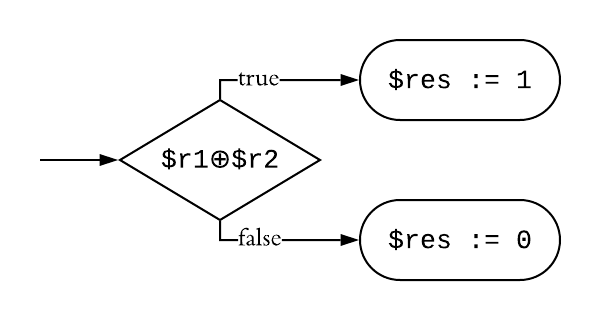Translation
- Intro
- Syntax
- Type Checking
- Translation
- Usage
- Version
Bob Simulator
The Bob simulator is as found here. In shorts we have a limited amount of memory and an unlimited amount of registers. Each slot has integer size (The simulator is written in JavaScript, so we use JS integers). After each execution the values of all registers prefixed with res. are stored internally (they are compared to a set of expected values) after which these registers are zero-cleared. All other registers and the memory is left as is.
Memory Handling
As stated Janus has a pass by reference policy. We implement this by solely using the stack part of memory. Our Bob model has a stack that grows bottom up as opposed to a normal x86 stack. This we have to take into account when translating: if we want to index into some array like so a[21] we add 21 to the address of the head of the array.
Resetting Branch Register
If a given jump is taken, we need to reset the branch register. Or else we keep on jumping ahead into undefined behavior. This is often done using a BRA instruction, as thus
l1:
BNEQ $reg1 $reg2 some_label
# code
some_label:
BRA l1
# continue
Zero Clearing Values
Before we dive into the translation, we need to discuss the need for zero clearing used registers and memory slots. The Bob simulator being reversible do not have any way move or overwrite registers or memory locations (described here). Thus the only way to store a value in a register is to either add, subtract or exclusive or the value into the register. Say we have the following Bob code within some loop (the condition could be 4 != x)
XORI $reg_1 4
l1:
BNEQ $reg_1 $reg_x some_label
Now if we take the branch and do not zero-clear $reg_1, during next iteration of the same code we store the value 4 ^ 4 = 0 in $reg_1. If we expect $reg_1 to be 4, this behavior is undefined: we can't predict what will happen. To properly stay clear of this situation, we must clean up both if the branch is taken, and if it isn't. So we get
XORI $reg_1 4
l1:
BNEQ $reg_1 $reg_x some_label
XORI $reg_1 4 # clean up right away
# code
some_label:
BRA l1
XORI $reg_1 4 #clean up if
This also applies on a global scale: if some Bob program does not clean up after execution, we might end up with undefined behavior if registers are reused. As stated above the simulator only zero-clears res. registers.
Zero-clearing has some interesting properties:
- We have no need for garbage collection
- If we were to include some sort of dynamic alloc function, the programmer would have to call free, otherwise we would end with undefined behavior.
Tranlating Using Templates
We translate using a set of templates. Each Janus construct is made in order to conform to its syntax. So we translate each syntactic construct into predefined Bob code. Some of these translations are here illustrated with flow charts.
Procedures

Translates into
# template for procedure
l_top:
BRA proc_bot
POP $raddr
l:
SWRET $raddr
NEG $raddr
PUSH $raddr
# procedure code
l_bot:
BRA proc_top
Conditional Statements

Translates into
if_top:
BGEZ $if if_else
#code for then
if_then:
BRA if_bot
if_else:
BRA if_top
# code for else
if_bot:
BGEZ $fi if_then
Loops

Translates into
loop_top:
BGEZ $entry loop
# code for do
loop_do:
BLZ $exit loop_bot
# code for loop
loop:
BRA loop_top
loop_bot:
BRA loop_do
Compare Operators

If we need to evaluate a compare operator (⊕ = [ >,<,≥≤,=,≠ ]), we can do so as illustrated in Figure 4. This results in the following code where we need to zero-clear the registers we have used.
c_top_pre:
BGT $r1 $r2 c_true_pre
c_false_pre:
BRA c_bot_pre
c_true_pre:
BRA c_top_pre
XORI $res 1
c_bot_pre:
BLE $r1 $r2 c_false_pre
# Code that can use $res in condition
c_bot_post:
BLE $r1 $r2 c_false_pre
c_true_post:
BRA c_top_pre
XORI $res 1
c_false_post:
BRA c_bot_pre
c_top_post:
BGT $r1 $r2 c_true_pre
Local/Delocal
A local-delocal statement has the form
local int a = 200 + b
... code that has a in scope ...
delocal int a = 20
Where local is translated into
... expr result into $e_res_pre ...
XOR $temp1 $e_res_pre ; use temp to store res
PUSH $temp1 ; push sets $temp1 to 0
XOR $f.a.0 $spointer ; store address
... expr clean up ...
And delocal into
... expr result into $e_res_post ...
XOR $f.a.0 $spointer ; unstore address
POP $temp1 ; pop resets $temp1
XOR $temp1 $e_res_post ; clean up temp1
... expr clean up ...
In forward execution if the delocal check does not match, we will not clean the register $temp1 up properly in the resulting Bob code. Thus we end up with undefined behavior.